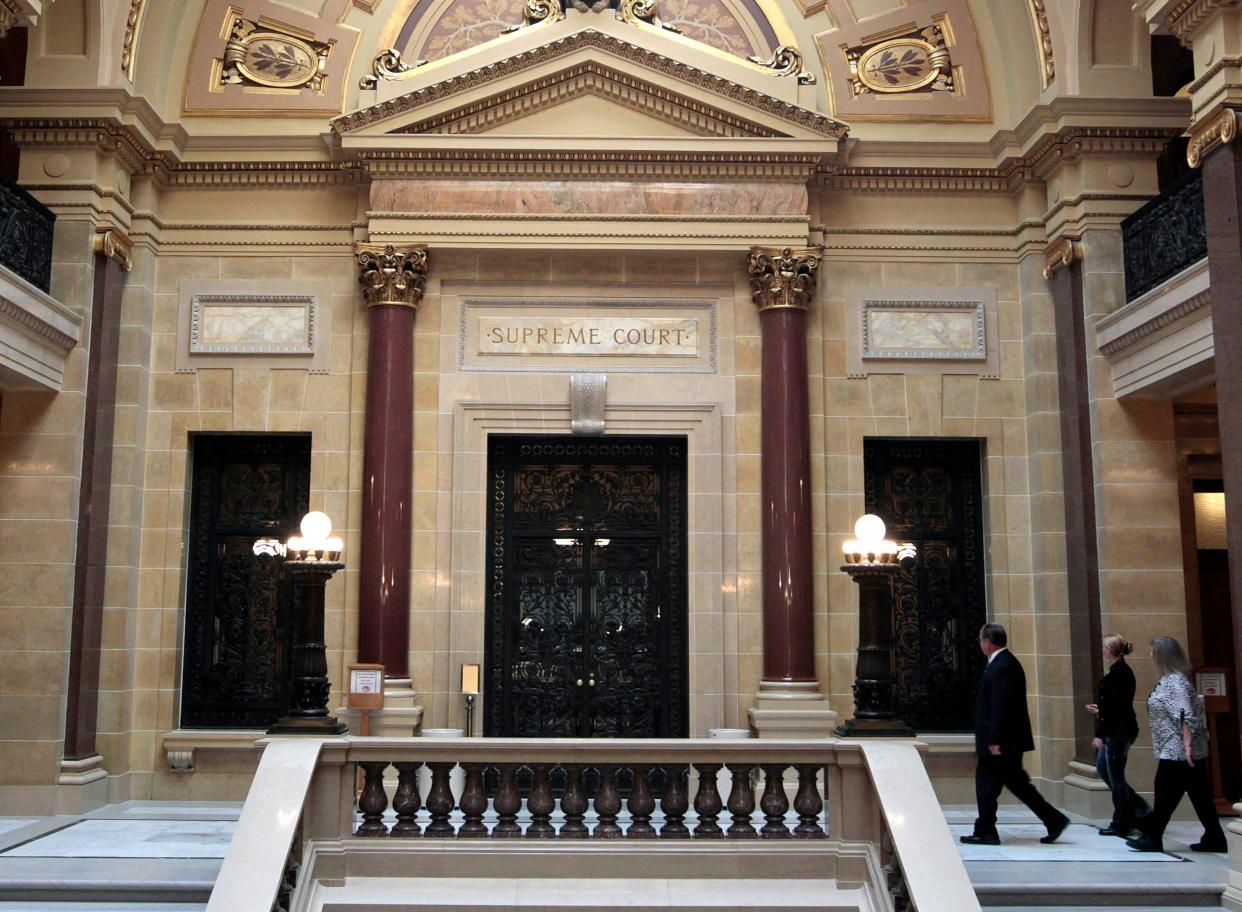Wisconsin Supreme Court rules Marsy's Law was properly enacted into law

MADISON - The Wisconsin Supreme Court has rejected a challenge to a constitutional amendment known as Marsy's Law aimed at expanding and strengthening the rights of crime victims.
The 6-1 decision released Tuesday by the state's highest court overturned a Dane County judge's 2020 ruling that determined the measure was improperly enacted and should be rescinded. The court said in its decision the referendum was properly worded and therefore legally adopted.
Voters adopted what's known as Marsy's Law as an amendment to the state constitution in April 2020. The amendment was then challenged by Wisconsin Justice Initiative, former state Democratic Sen. Fred Risser of Madison and defense attorneys Craig Johnson, Jacqueline Boynton and Jerome Buting.
In the circuit court, Dane County Judge Frank Remington concluded the question presented to voters was inexact and misleading. He said voters should have been asked two questions instead of one so they were aware the amendment both increased the rights of victims and diminished the rights of those accused of crimes, he ruled. That ruling was appealed.
In December 2021, the District III Court of Appeals decided it makes more sense for the issue to go directly to the Supreme Court, and certified the case to the high court. How the issues are resolved "will have a sweeping effect on our criminal justice institutions and those operating within them," the Court of Appeals wrote, and so a timely, final decision would be in everyone's interest.
On Tuesday, the state Supreme Court said the argument put forward by the plaintiffs sets a bar for constitutional amendment questions that does not exist in state law.
"Not a single constitutional amendment in Wisconsin history has ever undergone judicial review using this ostensible test," Justice Brian Hagedorn wrote for the majority. "Examining the original meaning of the Wisconsin Constitution, we discern no such requirement, and therefore we decline the invitation to fashion a new, exacting constitutional standard. The constitution itself requires only that the legislature "submit" the proposed amendment to the people."
In 1980, Wisconsin became the first state in the country to adopt a "crime victims bill of rights" and in 1993 adopted a constitutional amendment to afford victims' privacy and ensure they are kept abreast of their cases.
Marsy's Law is named after Marsy Nicholas, who was murdered by her former boyfriend in 1983. He confronted her family a week after she died, when the family was unaware he'd been released on bail. Her billionaire brother started efforts to expand victims' rights which became the national Marsy's Law movement.
Wisconsin Justice Initiative had previously tried to keep the question off the ballot in April 2020.
In a separate decision Tuesday, the Wisconsin Supreme Court cited Marsy’s Law in overturning 30 years of precedent that gave a criminal defendant the ability to have a judge review the victim’s privately held, otherwise privileged health records.
The court, in a 5-2 decision, determined that the 1993 Wisconsin Court of Appeals ruling granting those rights was wrongly decided, unworkable and its rationale has been undermined by the adoption of Marsy’s Law and other laws protecting the rights of victims.
The court reached its conclusion in a case in which a Waupaca County man charged with several felonies for allegedly sexually assaulting his son and daughter had wanted the judge to review his son’s mental health and counseling records. The Supreme Court ruled that the circuit court must deny the defendant’s motion to have the judge review the records.
Justice Rebecca Dallet wrote the majority opinion, joined by justices Patience Roggensack, Hagedorn, Jill Karofsky and Rebecca Bradley. Ann Walsh Bradley and Chief Justice Annette Ziegler dissented.
“While the majority’s result is certainly protective of alleged crime victims, I question whether it impairs the truthseeking function of our courts,” Bradley wrote.
Here is how those in the legal field responded to the court's ruling
Reaction to the decision on Tuesday was mixed.
Marsy's Law for Wisconsin declared the move a victory that ensures "crime victims are treated with the fairness, decency, and respect they deserve and our Wisconsin Constitution requires."
"Marsy’s Law has been providing crime victims in Wisconsin with a stronger voice and more meaningful rights since its overwhelming ratification vote more than three years ago," the organization said in a statement. "Today’s decision by the Wisconsin Supreme Court removes any uncertainty about Marsy’s Law in our state and ensures future generations of Wisconsinites, who find themselves in the criminal justice system through no fault of their own, will have access to some of the strongest victims’ rights in the country."
The Wisconsin Justice Initiative intends to appeal the decision and continue to challenge Marsy's Law in court.
"WJI agrees with Justice Ann Walsh Bradley's dissent,” WJI executive director Margo Kirchner said in a press release. “The Supreme Court has given the Legislature permission to frame and word referendum questions that leave out important information for voters and even mislead them.
"The Wisconsin Constitution is the foundation of our state’s laws; changes to it should not occur on the basis of insufficient and misleading ballot questions.”
Drew Dawson of the Journal Sentinel and the Associated Press contributed to this report.
Molly Beck can be reached at [email protected].
This article originally appeared on Milwaukee Journal Sentinel: Wisconsin Supreme Court rules Marsy's Law was properly enacted into law